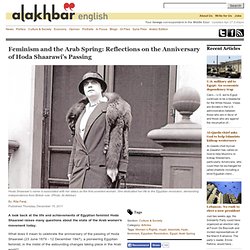

Hoda Shaarawi. La rue Hoda Shaarawi au Caire donne sur la rue Talaat Harb, qui relie la place du même nom à la place Tahrir, maintenant connue dans le monde entier.

J’ai souvent emprunté la rue Hoda Shaarawi pour rejoindre l’ancien jardin du café Riche, qui abrite maintenant le roi du narguilé en plein air, été comme hiver. D’ailleurs le café s’appelle Al Boustan (le jardin). Mais qui était Hoda Shaarawi ? Une grande dame révolutionnaire, et une des premières féministes égyptiennes, fondatrice de l’Union féministe égyptienne, en 1923. En cette journée du 8 mars, je voudrais lui rendre hommage. Hoda est née en 1879 dans une famille de la haute société, ce qui lui permit d’obtenir « le maximum d’instruction qu’une fille pût obtenir à cette époque », comme le dit joliment mon manuel d’arabe Al Kitab volume 2, dans le chapitre intitulé : « Les pionnières du mouvement féministe arabe ».
Durriyyah Shafiq (Egyptian author and reformer) Durriya Shafiq. (1908–1975), a controversial Egyptian feminist of the 1940s and 1950s and founder of the Bint al-Nil (Daughter of the Nile) journal and the feminist organization of the same name.

Durriya Shafiq, or Doria Shafik , was born in Tanta, Egypt, into a well-off family. After the death of her mother when she was thirteen, Shafiq attended a French missionary school in Alexandria and later studied in France, earning her license and her Doctorat d'État in philosophy from the Sorbonne. While in Paris she chose to marry her cousin, Nur al-Din Ragai , who was also pursuing doctoral studies. The couple eventually had two daughters.
Once back in Egypt, Shafiq faced discrimination as a “modern woman” and was refused the academic position she sought at the national university. In a time of political turmoil and change in Egypt, Shafiq helped lead middle-class Egyptian women in the struggle for political rights. Féminisme - Où est Amina,… - Et le printemps des… - Presse égyptienne - « Les femmes… - Monde arabe : quand… Samedi 15 juin 2013 6 15 /06 /Juin /2013 10:27 L'une de leurs pratiques emblématiques consiste à manifester seins nus afin d'affirmer que leur corps n'est pas un instrument au service d'une société patriarcale, mais qu'il leur appartient.

Le corps des femmes étant instrumentalisé en permanence par les hommes et les médias, leurs manifestations sont une façon de se réapproprier le corps féminin comme symbole de résistance contre la société patriarcale. Se dénuder est donc un moyen par lequel les femmes peuvent "récupérer leur corps" dans le combat d'ensemble contre un système patriarcal. Certains milieux féministes approuvent cette logique, mais je n'entends pas discuter ici des tactiques féministes. Je veux montrer que la volonté des Femen d'universaliser leur type de féminisme confère un caractère néocolonial à leur militantisme et à leur organisation.
Quoique apparues après ce mouvement de réaction, les Femen semblent renouer avec les tendances de la première vague du féminisme. Feminism and the Arab Spring: Reflections on the Anniversary of Hoda Shaarawi’s Passing. A look back at the life and achievements of Egyptian feminist Hoda Shaarawi raises many questions about the state of the Arab women’s movement today.

What does it mean to celebrate the anniversary of the passing of Hoda Shaarawi (23 June 1879 - 12 December 1947), a pioneering Egyptian feminist, in the midst of the astounding changes taking place in the Arab world? Looking back to the period in which this pioneering Arab feminist lived, a period that witnessed a burgeoning women’s movement inside and outside Egypt, and comparing it to the status of Arab women in the 21st century, is both painful and disconcerting. One reason for this concern is that the hijab — a head covering worn by Muslim women — has made a comeback in the Arab world since the 1970s.
And the niqab — a veil that covers the face, which Shaarawi removed in 1923 after coming back from Rome, in a highly symbolic and defiant manner — has also resurfaced. Removing the veil was not new to her. Femmes sous lois musulmanes.